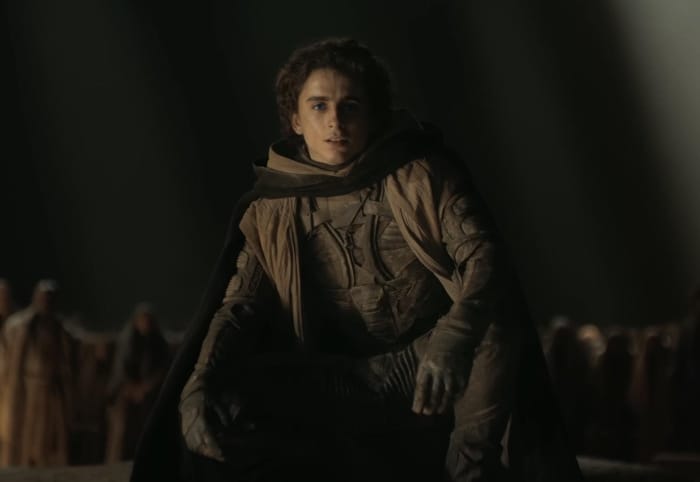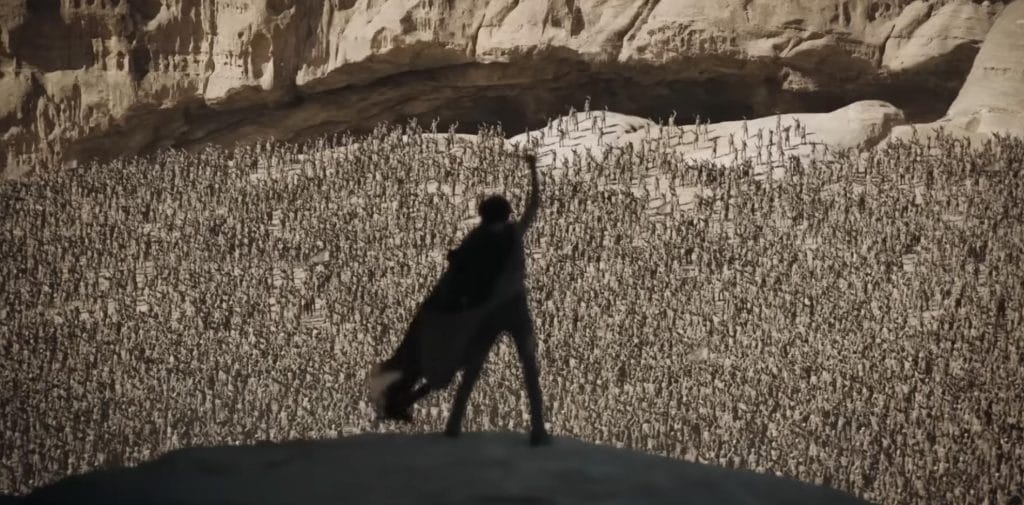Saviors and prophesized heroes are a trope ripe for dissection and subversion, as shown in Dune.

“I wrote the Dune series because I had this idea that charismatic leaders ought to come with a warning label on their forehead…” Such were the words of acclaimed author Frank Herbert, describing his seminal science-fiction series Dune. A landmark of epic storytelling, Dune influenced much of modern sci-fi as we know it. Galactic empires, exotic worlds, mystical orders manipulating civilization from behind the scenes, many tropes present in stories like Star Wars can be traced back to Dune. One one in particular stands out, and that is the ominous myth of a “chosen one”.
Now, the Chosen One is an archetype that existed long before Dune. Some hero foretold by fate, who will appear and change the nature of a story simply by existing. Take the Arthurian legends of Britain, and their eponymous king. Their presence Taken at face value, a Chosen One is a fairly straightforward stock character. Such a messianic archetype seems too good to be true, doesn’t it?
In the case of Dune, Frank Herbert decided the answer was yes. Paul Atreides, the self-proclaimed messiah, was indeed too good to be true. Dune, above all else, was a warning. A warning against charismatic saviors who appear to have all the answers, and the power they wield.
In the wake of Denis Villeneuve’s acclaimed two-part adaptation of Herbert’s first book, let’s take a look at Dune. Let’s compare its brutal deconstruction of the Chosen One to another legend which precedes it, and how said deconstruction endures.
The Hero
Dialing back the clock at least a thousand years, we revisit the legend of Arthur Pendragon. King of the Britons, leader of the noble Round Table, and expert in all matters concerning swallows.
National Hero
While scholars can argue until the heat death of the universe whether or not Arthur existed, and what kind of a man he was, his legend is perhaps one of the most enduring of all time. The mythos built around him depicted Arthur as a messianic hero. Foretold by the wise sage Merlin, Arthur was posited as a savior of his people, who would unite the Britons for a brief but shining period and repel the foreign invaders at their door.
Both in-universe and in the annals of history, Arthur has been appropriated by generations’ worth of folklore so as to fulfill various peoples’ ideals of kingship, and heroism. Arthur the king was, in many ways, a prototypical superhero who inspired not just other characters in his mythic world, but people who retold his legend.
And though his flaws as a man, and the faults or crimes of those around him eventually lead the idealized realm of Camelot to ruin, Arthur is not deemed a failure. All he achieved, all he built, it meant something. And it still does.
Once and Future King
In John Boorman’s 1981 classic Excalibur, Arthur muses just before his final battle that he was born not to live as an ordinary man, but to be remembered as a legend. It’s important not that his kingdom lasts forever, but instead that it be remembered. “And because it will not be forgotten,” he muses, “that fair time may come again.”
Much of the Arthurian legend holds to this belief. Many interpretations and adaptations leave the audience with the idea that one day, when Britain’s need is greatest, Arthur will fulfill his messianic role and return to save them.
King Arthur’s legacy was, is, and always will be a hopeful one. He is the Chosen One trope played straight, and we the audience buy into it.
Such is not the story of Dune.
The Warning
From the very beginning, the saga of Dune depicted the rise to power of Paul Atreides as a tragedy. His origins, the course of his life, and even his very nature utterly dismantled the idea of the messiah as somebody to be welcomed. Let alone one to be followed.
Prophecy as Control
Paul’s story begins when his noble family is targeted for extermination by rulers of the Empire which dominates much of the known universe.
Upon escaping this attempted murder, Paul’s best chance for retribution lies in a conspiracy that’s lasted almost as long as the Empire itself. The conspiracy, seeded by the seemingly omniscient Bene Gesserit order, aims at creating a superior being that will take control of human civilization. In Paul, the Bene Gesserit see the possibility of this “Kwisatz Haderach” coming to fruition.
Paul’s potential for this supreme power coincides with that age-old trope; the mysterious prophecy. On the dangerous planet of Arrakis, the source of the Empire’s most dangerous resource and site of his family’s attempted murder, an entire civilization of warriors waits for a savior. They call him the “Mahdi”, or “Lisan al Gaib”.
These desert-dwellers, the Fremen, have been oppressed for decades by Paul’s enemies in the Empire. They suffer horrific violence and humiliation, yet their faith never wavers. The Fremen are ripe for deliverance, a messiah.
And it would seem Paul is that messiah.
Unfortunately, there’s a catch in this great plan. It was all manufactured. The Bene Gesserit seeded the prophecy of the Lisan al Gaib among the Fremen. It was all just another scheme for control, one Paul will use in his quest for vengeance against the Emperor.
By becoming the Lisan al Gaib, Paul will seemingly deliver the Fremen from oppression. But in truth, they will only be serving a different oppressor. One who preys on their desperate need for a hero, and turns them into fanatics ready to wage galactic war.

Holy War
Paul’s revolution not only corrupts the Fremen into his willing servants, but also plunges the Empire into chaos.
Paul’s plan depends on claiming power over the spice, the all-important resource that keeps the entire Empire going. More than that, the final stage of his plan sees him ascend to the role of Emperor. In some simpler, more idealistic stories, Paul would be an unambiguous hero.
But he’s not. As a product of the Bene Gesserit’s plying with noble bloodlines and those genetically disposed to psychic powers, Paul can see the future. And should he pursue war, and take the throne, the future holds death. Spurred by his cult of personality, the Fremen will launch a jihad that leaves over 60 billion people dead across the known universe.
Paul knows this. Once again, in other stories starring a more heroic and selfless protagonist, said protagonist would wish to avert such a disaster. And indeed, Paul isn’t eager to bring this holy war to fruition.
…But then he does. His desire for vengeance, the seemingly inevitable feeling of doom brought by his prescience, and the Fremen’s terrible need to believe in him as their Chosen One proves too great for him to resist. Paul commits to the fight and sets the holy war in motion, dooming both himself and the galaxy.
In fulfilling prophecy, and accepting his role as Dune‘s Chosen One, Paul has become not the kind and inspiring hero, but the villain we the readers are meant to fear. Frank Herbert takes not just the Fremen’s expectation for a hero and upends it, but ours as well.
Conclusion
Audiences are used to seeing the Chosen One as one of the good guys. We expect the noble hero topple the resident evil empire and live happily ever after.
But it’s not always so simple. Those who are given tremendous power won’t always use that power wisely, and Frank Herbert channeled that sobering truth as he penned Dune.
Denis Villeneuve’s two-part epic honors this message in horrifying fashion. And for this lifelong Star Wars fan, it was indeed horrifying to see a Chosen One perhaps even darker and more tragic than, say, Anakin Skywalker. Because in Star Wars, the end of the saga sees Anakin redeems himself for his crimes as Darth Vader. He lives much of his life as a villain, but dies a hero.
There’s no such hope for Paul Atreides.
He is the Chosen One, yes. But he was never the hero.













